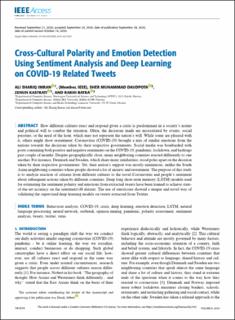| dc.description.abstract | How different cultures react and respond given a crisis is predominant in a society’s norms and political will to combat the situation. Often, the decisions made are necessitated by events, social pressure, or the need of the hour, which may not represent the nation’s will. While some are pleased with it, others might show resentment. Coronavirus (COVID-19) brought a mix of similar emotions from the nations towards the decisions taken by their respective governments. Social media was bombarded with posts containing both positive and negative sentiments on the COVID-19, pandemic, lockdown, and hashtags past couple of months. Despite geographically close, many neighboring countries reacted differently to one another. For instance, Denmark and Sweden, which share many similarities, stood poles apart on the decision taken by their respective governments. Yet, their nation’s support was mostly unanimous, unlike the South Asian neighboring countries where people showed a lot of anxiety and resentment. The purpose of this study is to analyze reaction of citizens from different cultures to the novel Coronavirus and people’s sentiment about subsequent actions taken by different countries. Deep long short-term memory (LSTM) models used for estimating the sentiment polarity and emotions from extracted tweets have been trained to achieve state-of-the-art accuracy on the sentiment140 dataset. The use of emoticons showed a unique and novel way of validating the supervised deep learning models on tweets extracted from Twitter. | en_US |

